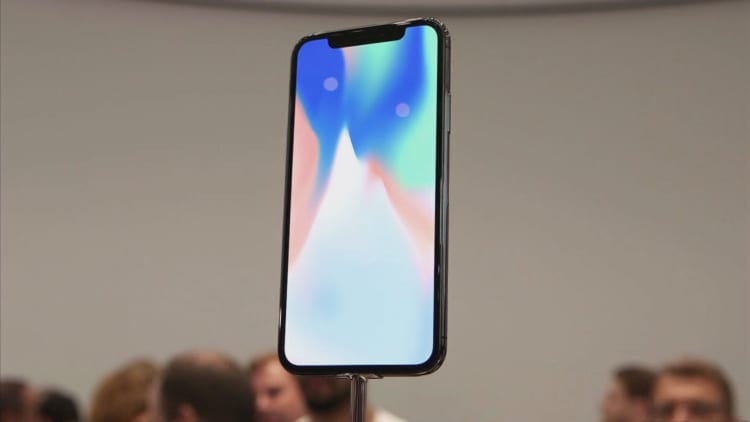
More and more, smartphone users are sticking with their aging devices until they croak, and the sky-high price tag for Apple's newly unveiled iPhone X could accelerate that trend — to the detriment of mobile carriers.
Over the past decade, mobile phone buyers have grown significantly more attached to their devices. The "replacement cycle" for wireless handsets ballooned to 24.9 months in 2016, more than half a year longer than it was in 2007, according to an August report from Recon Analytics. That's one reason why smartphone sales, in general, have declined precipitously in the past four years, to about 119 million in 2017 — down more than 9 million since 2014.
At the same time, smartphones have become more expensive: The average device bought in North America sold for $567 in 2017, up $36 from 2013.
Enter the iPhone X (pronounced "ten"), the newest redesign of Apple's industry-leading smartphone, officially announced at the company's product launch event on Sept. 12. , and with storage options up to $1,149, the X is easily one of the most expensive mainstream smartphones on the market. Even the bare-bones iPhone 8, the cheapest phone announced at the event, raises the price floor to $699, about $50 over the last generation of iPhones.
Apple's stock percolated to new heights in anticipation of the hardware announcements. Yet the week before the X was unveiled, S&P 500's Telecommunications Services had fallen more than 15 percent in 2017 to become the worst-performing sector in the entire index.
Change of plans
Consumers' increasing reluctance to ditch their phones coincides with an industry-wide shift in the way those devices are paid for.
In the recent past, it was not at all unusual to walk into a mobile provider, sign a multiyear contract and walk out with a brand new phone — without paying a single cent up front.
Mobile carriers could afford to give away "free" phones by factoring hidden hardware costs into consumers' monthly payments. With a two-year contract, a mobile carrier might recoup the cost of a phone in 12 or 16 months. But the customer will continue paying the same monthly fee for the duration of their contract. Once the hardware costs have been recouped, the carrier starts making more money off the user.
Nowadays, most mobile carriers have switched to "equipment installment plans," which let phone buyers know exactly how many months they'll be paying for a new handset. Once the phone is paid for in full, monthly service fees will fall, providing a further incentive to hang on to one's current device.
"From the standpoint of the consumer, it's kind of nice," said Mike Dano, editor-in-chief of FierceWireless.com.
"It gives you a reason to pay off your phone, and then it also gives you a reason to keep your phone longer because your overall bill is lower."
As a consequence of these financing plans, wireless carriers make less money off a device than they could under a contract, and they often have to wait longer for consumers to upgrade their phones.
Crunch time
That transparency can also hurt wireless carriers' investments in newer, faster networks. When service providers invest in new wireless networks, or "spectrum bands," they often need consumers to upgrade to hardware that can accommodate the faster speeds.
T-Mobile, for instance, announced in April that it was spending more than $8 billion to acquire 45 percent of all licenses for faster "low-band spectrum," in an attempt to compete with Verizon and AT&T. But most smartphones don't currently support the new spectrum, according to The Verge.
The friction from opposing industry forces — the continual push for faster performance versus the elongating phone replacement cycle — can exacerbate "spectrum crunch," said Roger Entner, founder of Recon Analytics, in a 2015 study on mobile phone sales.
"As fewer people upgrade their devices, the pace with which consumers can use new unused parts of the networks on new spectrum slows down and consumers are stuck on congested legacy spectrum," Entner said.
That an increasing number of buyers are keeping their phones until obsolescence is salient in the Telecommunications Services sector, where mobile operators spent more than $45 billion on new spectrum in 2014.
The sector did receive a sizable boost during Apple's launch week. But some analysts, said Entner, foresee a short-term gain and a long-term loss.
The carriers' burden
Wireless carriers aren't standing still as the mobile industry shifts under their feet.
Sprint, in particular, has planted a flag in opposition to the interest-free financing options for the pricey new iPhones. The carrier's CEO, Marcelo Claure, says iPhone X buyers should perhaps be required to make a down payment or pay interest, according to The Wall Street Journal.
"We're not too excited with the prices going up and also having to finance that," Claure said at a recent investor conference, the Journal reported.
Sprint has felt a significant stock boost since last year, but its shares have fallen nearly 10 percent so far in 2017. Shares of Verizon and AT&T both fell more than 6.5 percent year-over-year. Only T-Mobile has seen equivocal stock gains, jumping 38 percent since last year.
Some analysts see the shift toward financing plans for high-end phones as a long-term win for consumers, who have more control over their purchases and can stick with a quality product for longer. Others, such as Roger Entner, say the decline of phone contracts leads inevitably to higher prices.
"Consumers clamored to pay more for their devices. And with it comes a whole plethora of negative effects," Entner said in an interview.
"Ultimately, you've exchanged a service contract for a devised financing contract," Entner said, "so your hand shackles come now in gold instead of steel."


